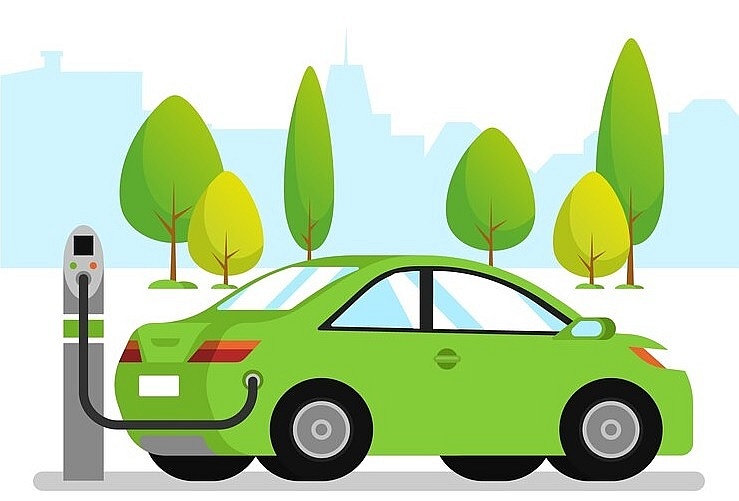Limitations abound for domestic EV carbon credits
E-motorcycle manufacturer Selex Motors is preparing procedures to issue carbon credits in 2025 for its Selex smart electric vehicle (EV) project, which completed verification process by the Gold Standard in late November.
 |
| Limitations abound for domestic EV carbon credits, source: freepik.com |
Gold Standard is an international standard for projects that reduce greenhouse gas emissions, including REDD+ projects.
The company also expects to start rooftop solar connections to charge Selex battery stations. Selex is renowned as the only company in Southeast Asia to exclusively develop all core components for e-scooters and a new operating system for 2-wheelers.
The company will collect operational data on each vehicle and the entire system, serving to calculate emissions, including distance travelled, number of battery changes, and energy consumed on the vehicle. In addition, the company will collect operational data on the station including a total number of battery swaps and total electricity consumed on each station and the entire network.
The total GHG emission reductions from project activities are expected to be over 197,000 tonnes of CO2e over the stated 5-year credit period.
Dang Hong Hanh, a technical expert for PoA Carbon Management said, “Switching to EVs is one of the methods to create carbon credits in the transport sector. The other types of projects are solar power for aircraft at gate operations, solar EV charging systems, and modal shift in passenger transportation. Fuel switch is also a solution to generate carbon credits, including a switch to biofuel and shore-side electricity supply.”
At present, the owners of low-carbon transport projects can trade carbon credits on three markets, including through domestic emissions trading system (ETS) compliance, and a voluntary carbon market. Besides that, on the international compliance carbon market, they have been able to trade on buyer countries’ ETS compliance and the CORSIA baseline-and-offset system that enforces carbon-neutral growth for the international aviation sector from 2020.
The potential is available, but is still uncertain due to the lack of a complete policy for establishing and trading carbon credits.
“According to the roadmap, Vietnam plans to pilot the carbon market in 2025 and officially operate from 2028. However, up to now, Vietnam still lacks an ecosystem and legal basis for carbon credits for businesses to operate,” Hanh said. “The first necessary thing is to determine whether carbon credits will be owned by the state, businesses, or people. There needs to be a clear legal corridor on the rights and responsibilities of each party to comply with the provisions of the law.”
Along with this limitation, the limited financial capacity and knowledge of the business community are also barriers to exploiting the potential of carbon credits.
“To achieve the Gold Standard for a project, and then the basis for producing carbon credits, is very complicated. Enterprises will undergo a comprehensive assessment, and strict appraisal of the production process, excluding the cost worth tens of thousands of US dollars for inviting an intermediate party for appraisal,” said Nguyen Huu Phuoc Nguyen, CEO and co-founder of Selex.
Enterprises also require personnel with an in-depth understanding of monitoring parameters, and knowledge about data storage, measurement frequency, and internal quality control.
“These requirements are challenging for businesses, especially smaller ones or startups. Meanwhile, the carbon credit trading market is still uncertain,” he said. “We know that the market has several risks, but we believe that powerful firms in collaboration with a complete policy system will enjoy the benefits.”
In Vietnam, there are no official projects generating carbon credits from e-vehicles. This approach has proven lucrative for pioneers like Tesla, which reported earnings of $1.79 billion from carbon trading in 2023 alone.
Industry experts note that while carbon credits do not directly influence vehicle buyers, they serve as vital assets for carmakers, enabling them to sell surplus credits accrued from EV production to other manufacturers. This assists them in complying with stringent global emission standards.
 | Promoting the Vietnamese carbon credit market Developing the carbon market is one of the key strategies to help Vietnam effectively address climate change and contribute to achieving net-zero emissions. Nguyen Thanh Cong, deputy head of the Department of Climate Change Economics and Information, at the Ministry of Natural Resources and Environment, spoke with VIR’s Hoang Oanh about the issue. |
 | Businesses pivotal in offsetting carbon measures in Vietnam Quantifying carbon emissions and implementing offset measures are being called urgent and a key factor to help businesses thrive in the green economy. |
What the stars mean:
★ Poor ★ ★ Promising ★★★ Good ★★★★ Very good ★★★★★ Exceptional
Related Contents
Latest News
More News
- Vietnam sets ambitious dairy growth targets (February 24, 2026 | 18:00)
- Masan Consumer names new deputy CEO to drive foods and beverages growth (February 23, 2026 | 20:52)
- Myriad risks ahead, but ones Vietnam can confront (February 20, 2026 | 15:02)
- Vietnam making the leap into AI and semiconductors (February 20, 2026 | 09:37)
- Funding must be activated for semiconductor success (February 20, 2026 | 09:20)
- Resilience as new benchmark for smarter infrastructure (February 19, 2026 | 20:35)
- A golden time to shine within ASEAN (February 19, 2026 | 20:22)
- Vietnam’s pivotal year for advancing sustainability (February 19, 2026 | 08:44)
- Strengthening the core role of industry and trade (February 19, 2026 | 08:35)
- Future orientations for healthcare improvements (February 19, 2026 | 08:29)

 Tag:
Tag:




















 Mobile Version
Mobile Version